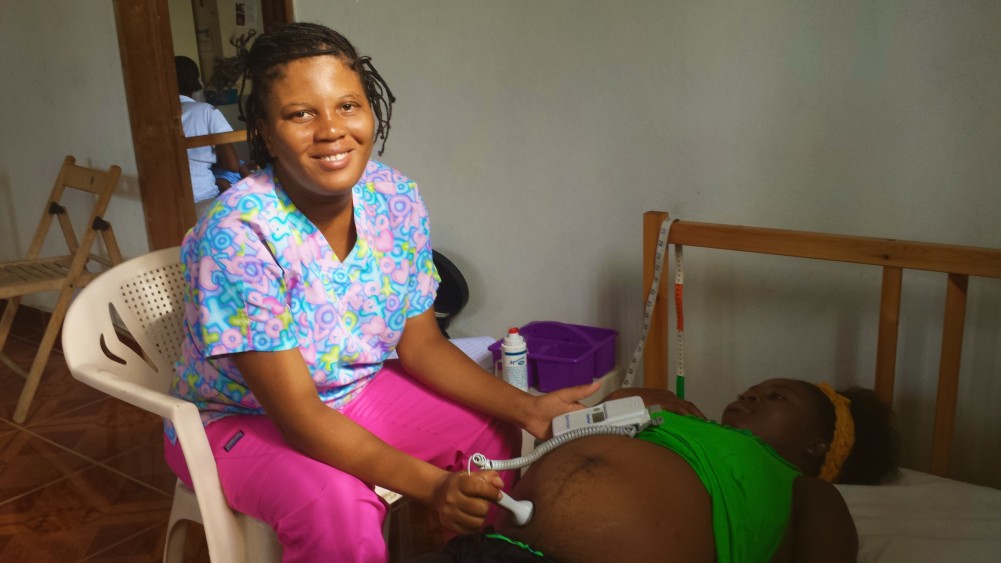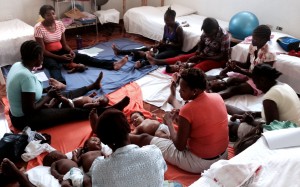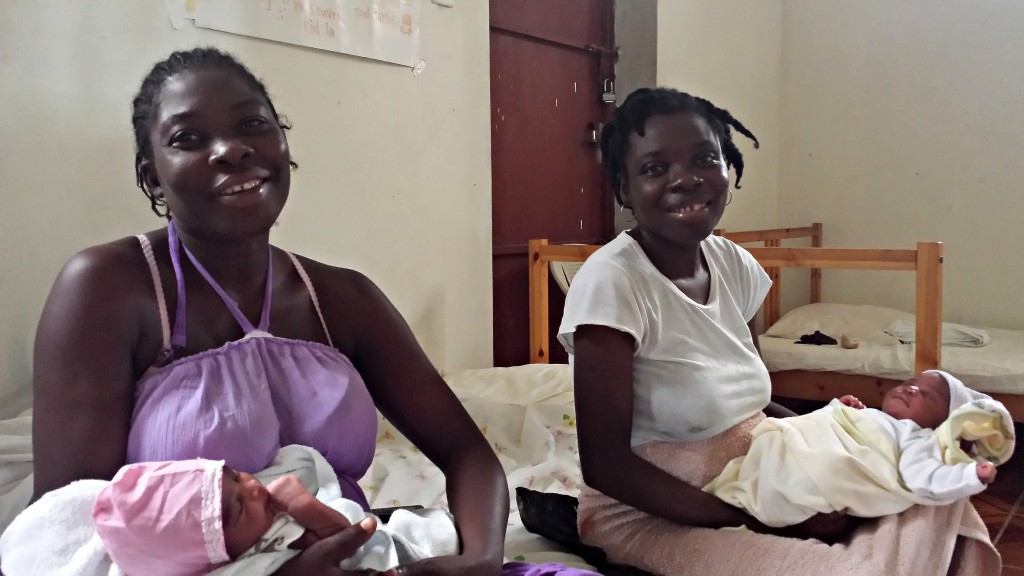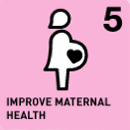
Mission
The mission of MamaBaby Haiti (MBH) is to provide a safe place for Haitian women to receive compassionate and respectful maternity care. The staff is dedicated to improving the health and well being of the women and infants of Haiti. This vision is achieved through midwifery care, delivered primarily by Haitian midwives and supported by volunteer midwives from around the world. Healthy women make for healthy families. Their goal is to offer services to women that will decrease their risk of dying from what should be a normal life event: pregnancy and birth. However, Haiti has the highest infant and maternal mortality rate in the Western Hemisphere. It is a core belief that no woman or child should ever die because of where they live.
Life Challenges of the Women Served
Women of childbearing age are affected by lack of services.
They have little access to screening, education and treatment for various ailments. This leads to lack of early treatment and high rates of cervical cancer. Many sexually transmitted infections remain untreated for long periods of time, leading to an increase in complications. Women are often misinformed about the causes, identification and preventive measures associated with chronic and acute sexual health illnesses.
Without services or education, women are also powerless to control family size and their own reproductive health. Haiti has the highest reported rate of cervical cancer in the world. The Pan American Health Organization reports most Haitian women have never been screened for cervical cancer. Screenings are so rare in Haiti, it is difficult to find exact figures on it. Screening, combined with treatment, would decrease cervical cancer rates. This is reflected in neighboring Caribbean countries with programs that have seen increased screening and subsequently decreased cervical cancer rates. Prevention and treatment are not enough; education is the third crucial component. Nearly all MBH patients are unaware of the causes of cervical cancer. Local Haitian women, Adeline and Yolette believe cervical cancer is associated with race, and did not know smoking and multiple partners put them at higher risk. The combination of screening, treatment and education will provide optimal efficacy in cervical cancer protection.
Medical records show 35 percent of the organization’s patients are interested in spacing children, stopping childbearing or gaining access to family planning resources. The unmet need for family planning at a national level is very similar a 37.5 percent. Women constantly come to the clinic lamenting their pregnancy, most commonly citing their trepidation stemming from poverty and/or unstable relationships putting their unborn child at a disadvantage.
The Project

The objectives of the program are to:
- Increase cervical cancer screening in North Haiti by 160 women per month.
- Improve sexual and reproductive health knowledge to an 80 percent level of understanding in 80 percent of patients attending the mandatory educational component of the program.
- Increase STI screening in North Haiti by 300 women per month .
- Increase treatment in North Haiti by 132 women per month .
Six health care professionals will attend a weeklong training program. After training, a community health agent or nurse will promote cervical cancer awareness and recruit patients to come to free cancer screening clinics. Weeklong clinics will be held for patient screening and education on causes and symptoms of cervical cancer and sexually transmitted infections and on family planning options.
Millennium Development Goals:
Questions for Discussion
- Why is MamaBaby Haiti offering cervical cancer and infection screening and treatment along with their pre- and anti-natal services?
- How do you think education increases the impact of access to health care?
- How do you think this project impacts future generations in Haiti?
How the Grant Will be Used
DFW’s grant of $44,996 over one year will fund teaching aids for education, staff training for cervical cancer screening and treatment, staff salaries, operating equipment and supplies, rapid tests for the diagnosis of sexually transmitted infections, medication, and hormonal contraceptives. The total program budget is $54,996, with in-kind donations from MamaBaby Haiti of $10,000.
Why We Love This Project/Organization
MamaBaby Haiti offers innovative and practical solutions to screening and treating cervical cancer and sexual transmitted infections in an area that has one of the highest incidences of cervical cancer in the world. Their strong partnerships with other medical services in the region combine to provide powerful holistic care for women and children. It is a local program with an indigenous staff which offers a comprehensive educational component that serves a medically underserved community.
Evidence of Success
When MamaBaby Haiti first began, women were coming to the clinic dying of several major pregnancy-related complications, including toxemia and hemorrhage. Women were uneducated on the warning signs of major complications and would often stay at home until something manageable turned into a life threatening complication. One of the most life threatening pregnancy related complications, toxemia, has decreased dramatically in the population the organization serves. Toxemia is a deadly disease that occurs only in pregnancy and can only be cured by giving birth. Often women would stay at home not understanding the “headache” was a sign of a serious possibility of a life-threatening stroke. Women are now being educated during prenatal care about the warning signs and are treated or referred to a higher level of care if complications begin to arise. Haitian midwives are well trained and educated to provide care that is well rounded, not only caring for the women medically, but also connecting with women in a healthy, positive relationship as a care provider and patient. In 2013, the organization reported 456 safe deliveries and 3,120 prenatal visits. Continuity of care and consistent education are decreasing the maternal and infant mortality rate.
Voices of the Girls
MBH patients, June 2014:
“I like [MamaBaby Haiti] because the nurses – the midwives – they talk to me wisely.”
“I feel safer and I have more confidence because I had a miscarriage. Now I’m pregnant and I can see they take care well of me so I am very confident that this baby will be fine.”
“I felt stress but they helped me at the class because I would not have enough money to go to a hospital or birth center so they can take care of me and the babies, but when I came here they did good things for me, they gave me meds, free care, and I love that.”
“[MamaBaby Haiti nurses] told me that whenever I have pain, even 7, midnight, or whatever, I can come here, they will take good care of me. This is different from the other hospitals because some other hospitals it depends when you go. That makes me happy.”
“I was told this morning how the baby will develop inside of my belly and what quality of food to eat so the baby can be healthy.”
“I come because I want to know how the baby is inside of my belly. It’s my first time pregnant and I would like to understand how the baby is.”
About the Organization
MamaBaby Haiti was created shortly after a group of American midwives traveled to Northern Haiti following the earthquake in 2010. They quickly recognized the need for increased awareness of issues related to childbearing women, access to medical care and a clean safe place to give birth. The birth center is modeled after freestanding birth centers in the US, offering Haitian women the opportunity to be cared for by trained midwives with compassion and skill. To date, MamaBaby has delivered more than 1,000 babies in the Cap Haitian area.
Facilities are fully staffed by Haitians and all of the clinical staff function in decision-making roles for the clinic. The organization is a stable part of the medical community that continues to give back to women, babies and students in the area. The board consists of Haitians and Americans working together. One of the major accomplishments is creating a new generation of midwives and care providers that respect women and their right to receive medical care, give birth and live in a dignified manner. They provide prenatal, birth, postpartum and pediatric care, as well as education and other life saving services. Care, provided 24 hours a day, seven days a week, is open to everyone who shows up – women, children and men.
The clinic staff educates mothers and families about prenatal health and nutrition, hygiene, childbirth and breastfeeding (with the goal of exclusive breastfeeding for a minimum of one year), contraception methods and sustainable living. They collaborate with Haitian midwives and midwifery students to reduce the maternal, fetal and neonatal mortality rate in Haiti. They believe all will benefit from learning from each other and serving the women together in safe and gentle births. In addition to providing health care, they work on village projects to improve sustainability and health for Haitian families. These projects include building latrines, working on getting clean water to villages and helping start village gardens and chicken coops.
Where They Work
Haiti is a free market economy that benefits from low labor costs and tariff-free access to the US for many of its exports. Poverty, corruption, vulnerability to natural disasters and low levels of education for much of the population all are among Haiti’s most serious impediments to economic growth.
In January 2010, Haiti’s economy suffered a severe setback when a 7.0 magnitude earthquake destroyed much of its capital city, Port-au-Prince, and neighboring areas. Currently, the poorest country in the Western Hemisphere with 80 percent of the population living below the poverty line and 54 percent in abject poverty, the earthquake inflicted $7.8 billion in damage and caused the country’s GDP to contract. In 2011, the Haitian economy began recovering from the earthquake. But two hurricanes adversely affected agricultural output and the low public capital spending slowed the recovery in 2012. Two-fifths of all Haitians depend on agriculture, mainly small-scale subsistence farming. They remain vulnerable to damage from frequent natural disasters, made worse by the country’s widespread deforestation.
Source Materials
Janine Baumgartner prepared the MamaBaby Haiti Program Fact Sheet and presentation.


